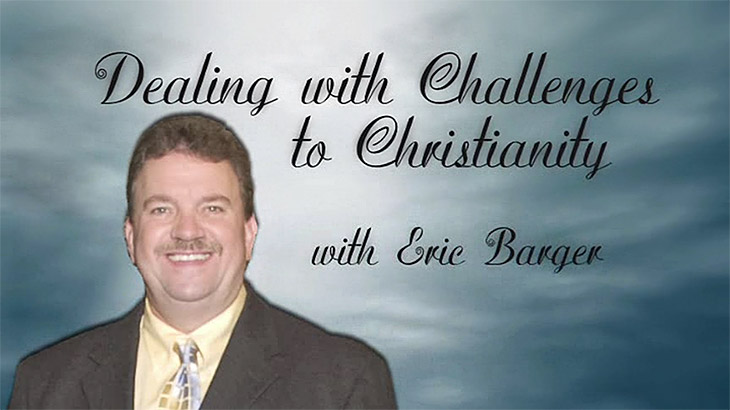
What are some of the most frequent questions asked by non-believers?
Dr. David Reagan and I on our ministry’s television show Christ in Prophecy had the pleasure of asking this question of Eric Barger of Take a Stand! Ministries. Eric is an authority on the cults, the New Age, and rock music today. From his past as a former drug addict and rock n’ roll musician who was deeply involved in the New Age movement, Eric has emerged since he gave his life to Jesus Christ to become a great defender of Christianity in America. He joined us to answer the most frequently asked questions by non-Christians about the Bible and Christianity.
Dr. Reagan: Nathan, let’s start with you. What would you say are the most frequent questions that you receive from unbelievers?
Nathan Jones: When it comes to unbelievers, there are two groups. Firstly, there are those who come across an article we put out and they really want to know our position. The second group, and this tends to be a bigger of the two groups, are those who just want to attack what we as Christians believe.
For those seekers who really want to understand the biblical supports, they want to know how we can trust the Bible as God’s Word. Concerning the Creation, they’ll ask how can we believe that God created the universe.
For unbelievers that come in attacking, they’ll usually accuse God of being all so bloody and demand to know what’s up with all those sacrifices. What’s all that blood about? And, since they claim we can’t use the Bible to defend itself, they’ll ask for some extra-biblical references to the Bible that proves the Bible is God’s Word.
Dr. Reagan: Eric, how about the questions you most get?
Eric Barger: There are several of them. I appreciate the one Nathan brought up there at the end concerning the idea of not using the Bible or quoting sections of the Bible and then quoting another section. I’d argue that it’s not circular reasoning to use the Bible in its defense, because the Bible is a compilation of different authors and different time periods and is actually 66 books bound together into what we call the Bible.
Okay, a couple of questions that I frequently get cover how we can believe the Bible doesn’t have errors. These antagonists claim that the Bible’s been doctored, or it’s been added to incrementally. I hear all those related questions in which a lot of people want to argue with me about. I don’t have a lot of time to just argue. But, for somebody who really wants the truth, I will go the extra mile to try to give them the answers they’re seeking.
Another question would be in relation to the accusation that Christianity is way too narrow in saying that Jesus is the only way to Heaven. Aren’t all religions equal? I get those questions about universalism a lot. People want Jesus on par with Mohammed, Buddha, and the rest.
Another question would be concerning why bad things happen to good people. If God is indeed a God of love, well how could that be with all the suffering going on? I get that question often.
Another question really argues that science should be the way we decide what’s truth. I hear that a lot. Of course, the origins of that question always comes back to the idea that Evolution trumps Creationism and therefore Christianity.
From Christians, the question I get frequently is, “Wait a second, do I have to believe all those doctrines to be a Christian?” I had a gentleman come up to me one time not so long ago and say, “I’m a Christian, but I don’t believe in that Virgin Birth business.” So, I said to him, “It’s a free country and you can believe what you want to believe, but I can’t call you my brother in the Lord if you don’t think Jesus was born of a virgin, because if He wasn’t, we’re still lost. Why then are your bothering to go to church? We’ll need then to be figuring out who the Messiah is because it wasn’t Jesus if He wasn’t born of a virgin.”
There are some doctrines that are non-negotiables, meaning beliefs I can’t budge on. There may be a lot of secondary doctrines we can agree to disagree on, but the essentials of the faith that are shown to us in the great creeds of the faith, those are the beliefs that are the essentials. Sadly, a lot of people just don’t want to believe in the essential doctrines which make the Christian faith.
Nathan Jones: I’d also add this question to our list, and it’s probably one of the biggest ones from Christians, asks if we must worship God on Saturdays? Good Christians are really confused about whether they should be dropping Christmas and Easter and instead worshipping on the Jewish holidays and on Saturdays.
Eric Barger: Interesting, I almost listed that one, too. A minute ago I thought about bringing that question up since I get it so often as well.
In the second segment of this series concerning common questions from non-believers, we’ll tackle the question, “How important is doctrine?”









